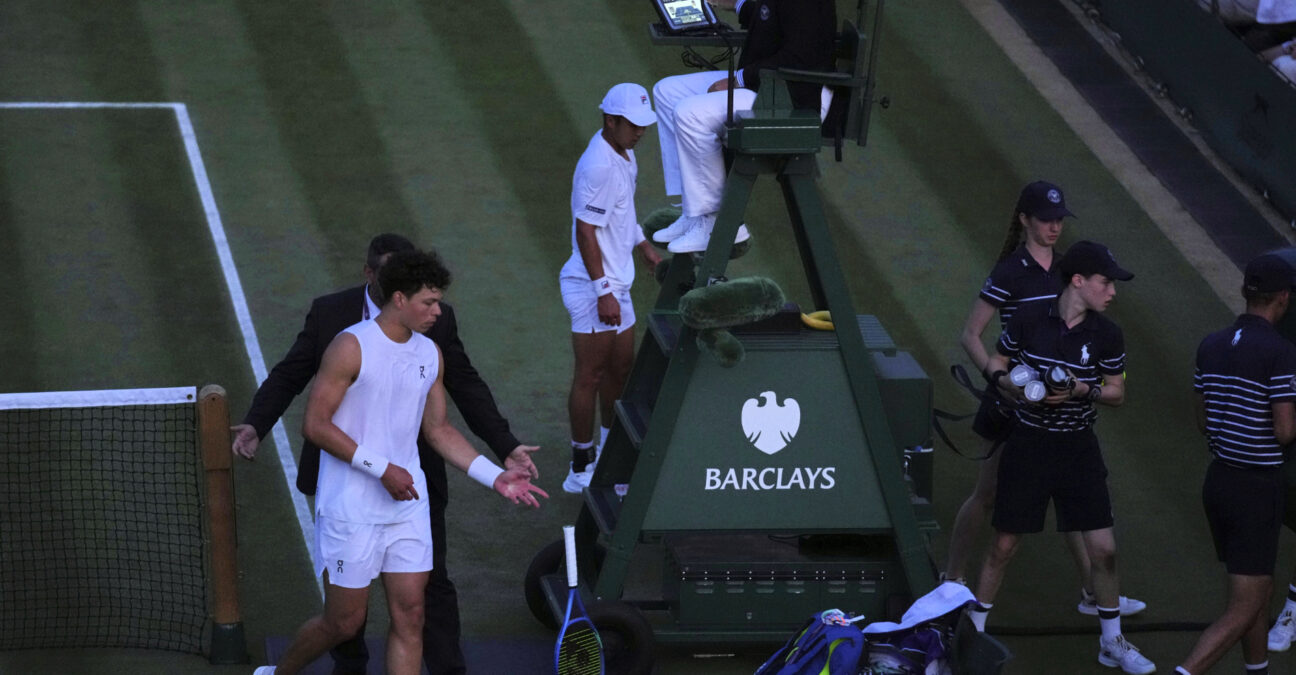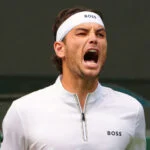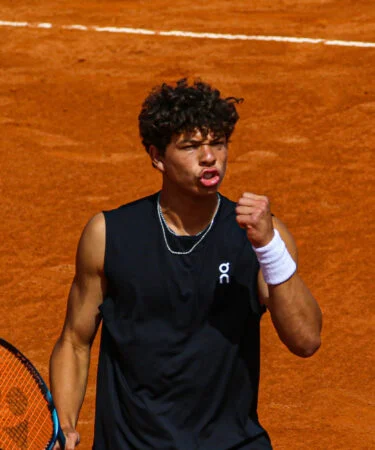Ben Shelton still furious over match suspension: “I only needed 60 seconds”, said the man who actually took 70 the day after
Ben Shelton and Rinky Hijikata remain puzzled as to why they were asked to return on Friday to play just one game at Wimbledon
 Ben Shelton debates with an official why his match against Rinky Hijikata had to be suspended | © AP Photo/Joanna Chan / SIPA
Ben Shelton debates with an official why his match against Rinky Hijikata had to be suspended | © AP Photo/Joanna Chan / SIPA
Ben Shelton may have won his second-round Wimbledon match against Rinky Hijikata in straight sets – 6-2, 7-5, 6-4 – but it was the interruption of that match, not the scoreline, that became the story.
On Thursday evening, Shelton was serving for the match at 5-4 in the third set when play was suspended due to fading light and the impending shutdown of the electronic line-calling technology used on court. The American, visibly frustrated, left the court fuming.
“Yeah, he [the umpire] said it was a five-minute warning until Hawk-Eye was going down. That included the changeover, so there wouldn’t be enough time to complete the game,” Shelton explained during his post-match press conference. “I was telling him, I only need 60 seconds (smiling). That’s kind of what my goal was when I went out there today.”
Hijikata : “A little bizarre”
Hijikata later described the moment as “a little bit bizarre,” but quickly made clear that he didn’t believe the delay altered the outcome. “I don’t think in any way that it changed the outcome of the match,” he said. “Ben played bloody well. He was a bit too good for me yesterday and today.”
What could have been a brief, triumphant finish turned into a 70-second formality on Friday morning – one service game, four points, each one an ace, and it was done.
“Some people were talking about it after the match. It wasn’t at all a single thought in my head (to win the most quickly possible to send a message). I got upset last night, yes. I was completely over it,” Shelton said. “But the only thing I was thinking about today was holding serve, how I was going to hold serve.”
“That was not in my head at all,” Shelton emphasised. “I wasn’t trying to do anything. I was just competing, trying to win the match.”
That tension between letting go of frustration and locking back into competitive focus framed Shelton’s experience. He may have joked afterward, comparing his 70-second performance to the legendary 11-hour-plus John Isner–Nicolas Mahut marathon in 2010 – “I guess I’m the opposite of Isner, right? He got the longest. I got the shortest. USA…” – but the decision still clearly left a mark.
Shelton’s questions
Shelton questioned why officials allowed the match to progress to a point where suspension became so awkwardly timed.
“I thought we could have stopped earlier,” Shelton said. “My opponent was complaining since the end of the second set. It seemed like there were better times – if they knew they were going to stop it – to stop it before it got to that point.”
Hijikata confirmed that both he and Shelton had raised concerns with the umpire earlier in the set. “We both said to the umpire, you know, I don’t think we’re going to finish this set. I think we should stop now and come back at the beginning of the set the next day,” he said. “I don’t really understand maybe some of the decision-making, but I guess maybe they have reasoning for it.”
“They were just upset that it had gotten to the point it had gotten to, which I can’t blame them for,” Shelton noted. “That 5-3 game, when I was returning at Love-40 – I literally couldn’t see the ball.”
Hijikata echoed those concerns. “By 3-2 or 4-2 it was already dark. Then we were playing in the dark for, like, 10, 15 minutes,” he said. “It was slippery also. I asked the umpire in the third set to come check the court. I said, ‘Mate, I think it’s slippery.’ Ben agreed. The back was a little bit slippery.”
The umpire reportedly told them it was fine. “It’s the same for both of you,” Hijikata recalled the official saying. “But it also means it’s maybe not safe for both of us. It’s still a level playing field, but it might not be a safe one.”
Why would we not play until [Hawk-Eye] goes down? Let’s just keep playing
Shelton couldn’t hide his irritation at the logic behind the suspension call. “Why would we not play until [Hawk-Eye] goes down? Let’s just keep playing,” he remembered saying. “He was like, ‘Oh, because we don’t want it to be in the middle of the game.’ I’m like, ‘I’m already serving for the match.’”
The curfew and lack of lights on outer courts have long been part of Wimbledon’s unique charm and tradition, but for players trying to stay focused and composed, it introduces a layer of unpredictability.
“It’s tradition. I understand. It’s also in a neighborhood,” Shelton said, referencing the site’s 11 p.m. curfew and no-lights policy.
His approach to that final game was pragmatic rather than theatrical. “I had a calculated approach with how I was going about my service game,” he said. “I wanted to make sure I wasn’t giving him second-serve looks or the ability to feel like he could swing out on the return.”
His first serve ended up being an ace – not by design, but a fortunate miss of his intended spot. That gave him the confidence to go bigger on subsequent points. The plan may have been conservative, but once he found the rhythm, he leaned in. “I just kind of improvised as it went,” he added.
Hijikata could only tip his cap. “That’s probably an absolute clinic on how to serve out a match if you’ve got one game to go,” he said. “It’s not easy when you have someone like that coming out for one game. I could have guessed right, still probably not getting a racquet on it. Yeah, credit to him.”
The brief outing didn’t stop Shelton from going through his usual post-match routine, including a full cool-down – habit, more than necessity. “They’re like, ‘Media in like 20 minutes.’ Okay. Should I shower?.” The story finished with a laughter.














